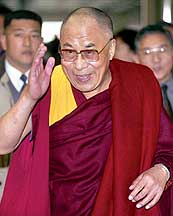Plan for Dalai Lama lecture angers neuroscientists
by David Adam, The Guardian, July 27, 2005
London, UK -- The Dalai Lama is at the centre of an unholy row among scientists over his plans to deliver a lecture at a prominent neuroscience conference.

<< The Dalai Lama
His talk stems from a growing interest in how Buddhist meditation may affect the brain, but researchers who dismiss such studies as little more than mumbo-jumbo say they will boycott the Society for Neuroscience annual meeting in November if it goes ahead.
Jianguo Gu, a neuroscientist at the University of Florida who has helped to organise a petition against the Dalai Lama's lecture, said: "I don't think it's appropriate to have a prominent religious leader at a scientific event.
"The Dalai Lama basically says the body and mind can be separated and passed to other people. There are no scientific grounds for that. We'll be talking about cells and molecules and he's going to talk about something that isn't there."
Dr Gu and many of the scientists who initiated the protest are of Chinese origin, but say their concern are not related to politics. The Dalai Lama has lived in exile in India since he fled Chinese troops in Tibet in 1959.
"I'm not against Buddhism," said Dr Gu, who has cancelled his own presentation at the meeting. "People believe what they believe but I think it will just confuse things."
The Dalai Lama has long had an interest in science and once said that if he had not been a monk he would have been an engineer. Over the past decade he has encouraged western neuroscientists to study the effects of Buddhist meditation, originally through meetings at his home and more recently by attending conferences at major US universities.
Buddhist monks typically spend hours in meditation each day, a practice they say enhances their powers of concentration.
Trained meditators claim to be able to hold their attention on a single object for hours at a time without distraction, or to shift attention as many as 17 times in the time it takes to snap your fingers.
Both claims go against current scientific thinking, which says attention cannot be held as long or switched so quickly, and some neuroscientists have started investigating whether they have a biological basis. Some believe the monks' skills could be down to plasticity, the ability of even fully formed adult mammalian brains to change and adapt.
The research peaked in November last year when a team led by Richard Davidson, a psychologist at the University of Wisconsin, Madison, published research in the US journal Proceedings of the National Academy of Sciences that suggested networks of brain cells were better coordinated in people who were trained in meditation.
The scientists included Matthieu Ricard, a Buddhist monk at the Shechenm monastery in Nepal, who has a PhD in molecular biology from the Pasteur Institute in Paris. They said the brain differences they observed might explain the heightened awareness reported by meditating monks.
Mr Davidson helped to arrange the Dalai Lama's talk at the neuroscience conference, which is the first in a series billed as dialogues between neuroscience and society.
The protesters say the team's research is flawed because it compared monks in their 30s and 40s with much younger university students.
Their petition reads: "Inviting the Dalai Lama to lecture on neuroscience of meditation is of poor scientific taste because it will highlight a subject with hyperbolic claims, limited research and compromised scientific rigour."
It compares the lecture to inviting the Pope to talk about "the relationship between the fear of God and the amygdala [part of the brain]" and adds "it could be a slippery road if neuroscientists begin to blur the border between science and religious practices".
Carol Barnes, the president of the Society for Neuroscience, said: "The Dalai Lama has had a long interest in science and has maintained an ongoing dialogue with leading neuroscientists for more than 15 years, which is the reason he was invited to speak at the meeting. It has been agreed that the talk will not be about religion or politics.
"We understand that not every member will agree with every decision and we respect their right to disagree."


